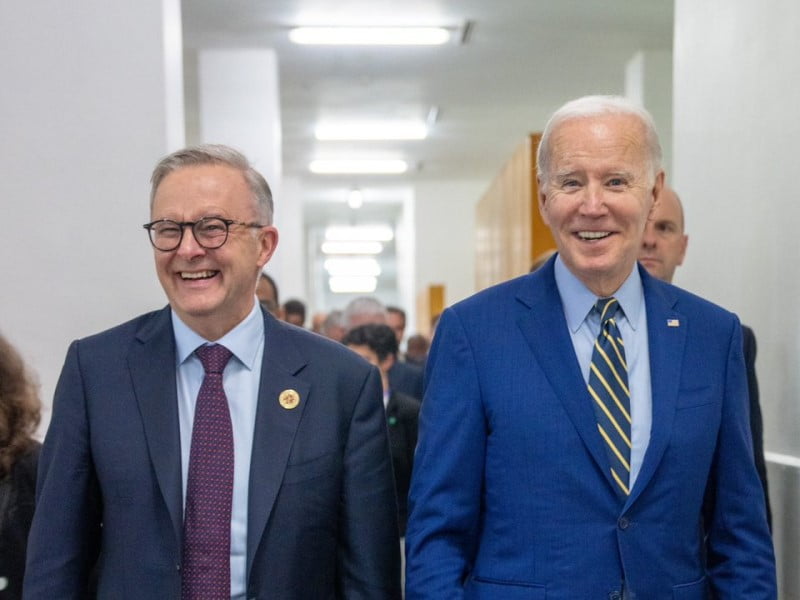The Australian government is calling on the United States to make assurances that green hydrogen production tax credits, legislated through the Inflation Reduction Act, will not distort the global market, as international pressure mounts.
In particular, the government is seeking “clarification on what, if any, steps the US may take to minimise the risk of its incentives causing distortion in the global hydrogen market”. It represents a more tentative version of the concerns expressed by the European Union.
The government also urged the US, as a member of the World Trade Organisation, “to consider its global trade obligations in implementing these elements of the IRA”, referring to tax credit increases when requirements such as domestic content, prevailing wage, and apprenticeship numbers are met.
US$369 billion is earmarked for ‘energy security and climate change’ activities through the IRA, including an up to US$3 per kilogram tax credit for the production of green hydrogen.

The Department of Climate Change, Environment, Energy, and Water submission to the US Treasury’s call-for-comment on the Inflation Reduction Act (IRA) was publicly released earlier this month.
It cautions that the act may cause distortion in global export markets and called for assurances that this effect would be minimised.
“As part of the globalised economy, with a significant export sector, Australia is conscious of the risk of unintended consequences from US domestic policy causing distortion in global export markets,” the submission reads.
“Respecting the US’ national interests in facilitating the growth of US domestic industry, Australia would encourage the US to draft guidance that minimises the possibility of negative impacts on the development of free, fair, open and well-functioning export markets in existing and new industries such as clean hydrogen, which operate consistent with the rules-based multilateral trading system.
“Australia would encourage the US to ensure implementation and delivery of this legislation is conducted in line with the US’ international obligations.”
In particular, Australia is asking for the US government to confirm if the tax credits will target clean hydrogen production for export or for US domestic consumption.
“We note the US has a substantial demand domestically for hydrogen, but with increasing investment in production for export globally, Australia would welcome clarification on what, if any, steps the US may take to minimise the risk of its incentives causing distortion in the global hydrogen market.”
A spokesperson for Energy and Climate Change minister Chris Bowen said the government has “put forward no specific view on what distortion in the global hydrogen export market may look like” in its submission.
“It expressed the view that a free, fair, open and well-functioning market is to the benefit of all participants,” the spokesperson said.
“I welcome the US action to decarbonise its national economy and contribute to clean energy supply chains, I have requested the Technology Investment Advisory Council, chaired by Dr Alan Finkel AC, to provide advice to me on the implications of the Inflation Reduction Act. This advice will inform the delivery of the Australian government’s policy agenda.”
Australia joins other jurisdictions in voicing concern that the IRA tax credits could be market distorting.
In the European Union’s submission to the same consultation, it described nine of the tax credit provisions in the IRA as having a “strong market distorting character within and outside the US”. This included the clean hydrogen, clean vehicle, and advanced manufacturing production credits.
“If implemented in its current form, the Act risks causing not only economic damage to both the US and its closest trading partners, resulting in inefficiencies and market distortions, but could also trigger a harmful global subsidy race to the bottom on key technologies and inputs for the green transition. Moreover it risks creating tensions that could lead to reciprocal or retaliatory measures,” the EU submission reads.
Similarly, the Norwegian embassy noted that it “is very concerned about certain elements of the IRA that discriminate against Norwegian products and producers based in Norway”.
When Australia’s Ambassador to the United States Arthur Sinodinos spoke with InnovationAus.com in mid-November he declined to comment on the “market distorting” concerns expressed by the EU.
Prime Minister Anthony Albanese said he discussed “how Australia can benefit from his ground-breaking Inflation Reduction Act” with US President Joe Biden in mid-November.
“The inflation Reduction Act envisages an enormous investment in clean technology. Australia has an opportunity through green hydrogen, through other innovation as well, to gain jobs and economic activity,” the Prime Minister said at the time.
Do you know more? Contact James Riley via Email.

